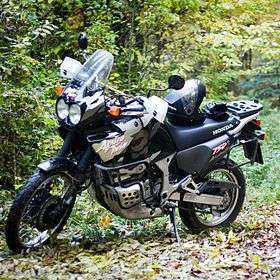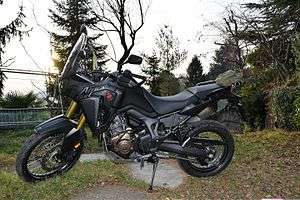Honda Africa Twin
The Honda Africa Twin is a dual-sport motorcycle made by Honda in two versions, first from 1996 to 2003 as the 750 cc (46 cu in) V-twin XRV750T, then from 2016 as the 1,000 cc (61 cu in) parallel-twin CRF1000L.
XRV750
 | |
| Manufacturer | Honda |
|---|---|
| Also called | Africa Twin |
| Production | 1989–2003 |
| Predecessor | Honda XRV650 |
| Successor | Honda CRF1000 |
| Class | Dual-sport |
| Engine | 742 cc (45.3 cu in) V-twin |
| Bore / stroke | 81.0 mm × 72.0 mm (3.19 in × 2.83 in) |
| Compression ratio | 9.0:1 |
| Ignition type | CDI with electronic advance |
| Transmission | 5-speed, chain drive |
| Frame type | Single downtube with double-loop cradle, rectangular section, steel |
| Suspension |
Front: 43mm air-assisted telescopic fork, 220mm wheel travel Rear: Pro-Link 214mm wheel travel with preload and compression damping adjustment |
| Brakes |
Front: two 276mm discs 2 piston calipers Rear: Single 256mm disc 1 piston caliper |
| Tires |
Front: 90/90 D21 Rear: 140/80 R17 |
| Dimensions |
L: 2,315 mm (91.1 in) to 2,380 mm (94 in) W: 905 mm (35.6 in) H: 1,243 mm (48.9 in) |
| Seat height | 860 mm (34 in) |
| Fuel capacity | 23 L (5.1 imp gal; 6.1 US gal) |
The XRV750 Africa Twin was a 742 cc (45.3 cu in) dual-sport based on the Honda NXR-750, which won the Paris-Dakar rally four times in the late 1980s.
It was preceded by XRV650 Africa Twin, which was a lighter, higher specification version made in 1988 and 1989 by Honda Racing Corporation with a 650 cc engine producing 42 kW (56 hp). The much earlier Honda XLV750R was a shaft driven motorcycle.
Built in homage to the giant desert racers of the Paris-Dakar Rally, the Africa Twin is a large, dual sport bike, powered by a softly tuned V-twin engine. It has twin headlights, a windscreen, and a long dual seat which stretches back from the tank to an aluminium grabrail and plastic coated luggage rack. An aluminium bashplate protects the bottom of the engine from flying rocks and impacts.
In December 1989 the original Honda XRV750 Africa Twin was launched, which became known as the 1990 model. In 1992 the Tripmaster computer was added. In 1993 the motorcycle had a major redesign including new frame, body work plastics, fuel tank, engine modifications and a lower seat. Nevertheless, it gained weight slightly. In 1996 the XRV gained an improved seat and clutch, larger silencer, modified upper fairing and luggage rack. However, the rear shock absorber lost some of its adjustability. In 2003 the Honda XRV750 Africa Twin ceased production. Nowadays good second hand examples are very much sought after among aficionados. Several aftermarket products exist with which to equip the bike such as crash bars to protect the vehicle's plastics and tank from damage in a low speed fall.
The engine is a 742 cc, 6-valve, four spark plug, liquid-cooled V-twin. The long-travel suspension insulates the rider from uneven surfaces. The brakes are twin discs at the front and single disc at the rear.
The later XRV's instruments feature a large trip computer LCD display mounted above the conventional speedometer and tachometer, styled like Dakar racers' navigational displays, and incorporates a range of extra electronic timers and trip meters.
Specifications
| L to N models (1990 to 1992) | P to S models (1993 to 1995) | T models onwards (1996 on) | |
|---|---|---|---|
| Overall length | 2315 to 2380 mm | ||
| Overall width | 895 mm | 905 mm | |
| Overall height | 1,420 mm | 1430 mm | |
| Wheelbase | 1,565 mm | ||
| Seat height | 880 mm | 860 mm | 870 mm |
| Weight (dry) | 209 kg | 205 kg | |
| Fuel tank capacity (including reserve) | 24 litres | 23 litres | |
| Wheels | Front 21-inch spoke, aluminium rim 1.85x21" Rear 17-inch spoke, aluminium rim 2.75x17" and 3.00x17" | ||
| Tyres | Front 90/90-21 54S Rear 130/90-17 65S |
Front 90/90-21 54S Rear 140/80-R17 69H | |
CRF1000L
 2016 Africa Twin with ABS | |
| Manufacturer | Honda |
|---|---|
| Also called | Africa Twin |
| Production | 2015- |
| Predecessor | Honda XRV750 |
| Class | Dual-sport |
| Engine | 998 cc (60.9 cu in) parallel-twin |
| Bore / stroke | 92.0 mm × 75.1 mm (3.62 in × 2.96 in) |
| Power | 70 kW (94 hp)@ 7,500 rpm(claimed) [1] |
| Torque | 98 N·m (72 lbf·ft)@ 6,000 rpm(claimed)[2] |
| Transmission | Chain final drive. 6 speed manual or 6 speed Dual-clutch transmission[3] |
| Frame type | Steel semi-double cradle |
| Suspension |
Front: 45mm inverted Showa fork 9.0 in travel Rear: single prolink shock 8.7 in travel |
| Brakes |
Front: Dual 310 mm disc Rear: single 256 mm disc |
| Tires |
Front: 90/90-R21 tube type Rear: 150/70-R18 tube type |
| Wheelbase | 1,600 mm (62 in) |
| Seat height | 880–850 mm (34.5–33.5 in) |
| Weight | 228–242 kg (503–534 lb)(claimed)[1] ABS,DCT/ABS (wet) |
| Fuel capacity | 18.9 L (4.2 imp gal; 5.0 US gal) |
The CRF1000L is a 998 cc (60.9 cu in) parallel-twin dual-sport that revived the Africa Twin name for the 2016 model year. It became available in the UK in late 2015 and early 2016 in the US. It was developed as a modern interpretation of its predecessors, the XRV 750 and XRV 650, based on the NXR-750 which won the Paris-Dakar rally four times in the late 1980s. The original V-twin Africa Twin was first sold in Europe from 1988 to the final production year of 2003 but was never brought to the United States.[2] The CRF1000L has also been seen as a response by Honda to the heavier on road focused adventure touring motorcycles such as the BMW R1200GS, Ducati Multistrada, and Triumph Tiger Explorer with a lighter more off road focused machine.[4]
Automatic Dual Clutch Transmission
In a first for the category, the Africa Twin has the option of an evolution of Honda's Automatic Dual-clutch transmission (DCT) technology, which remains unique to Honda in motorcycling. This latest evolution of DCT has been specifically developed and programmed to provide off-road ability. [5]
Prototype
The first confirmations of a new off-road focused touring motorcycle came in June 2014 when Honda filed a patent for an externally mounted airbox configuration which would allow for a more slender and lower mounted fuel tank in future dual sport motorcycles.[6] This increases off road handling by allowing riders to slide further forward into turns without being inhibited by a wide fuel tank with a higher center of gravity.[7]
The first full prototype of the CRF1000 was revealed at the 2014 EICMA international motorcycle show in Milan, Italy. The prototype was heavily disguised with camouflage and covered in mud so that it did not reveal any specific details about the new motorcycle other than visual details such as a parallel twin engine, dual front disk brakes with ABS, 21 inch front and 18 inch rear tires on spoked wire rims, and the absence of a shift lever, indicating the dual-clutch transmission from other Honda motorcycles such as the Honda VFR1200X and NC700X/NC750X could be an available option.[3][8]
After the EICMA reveal, Honda began releasing a series of videos titled "True Adventure" documenting the history of the Paris-Dakar rally-winning Africa Twins in the 1980s in anticipation of the release of the new true adventure.[9]
References
- 1 2 Suesse, Ned (December 18, 2015). "2016 Honda Africa Twin – FIRST RIDE REVIEW". Cycle World. Retrieved March 21, 2016.
- 1 2 Henning, Ari (December 15, 2015). "First Ride: 2016 Honda CRF1000L Africa Twin". Motorcyclist. Retrieved March 22, 2016.
- 1 2 Beeler, Jensen (November 2014), "Up-Close with the Honda "True Adventure" Prototype", Asphalt and Rubber, retrieved 2014-11-12
- ↑ Connor, William (November 2014), "The new Africa Twin? Honda True Adventure", Ride Apart, retrieved 2014-11-12
- ↑ MacDonald, Sean (December 2015), "Ride Review: The 2016 Honda Africa Twin Is Exactly What We've Been Waiting For", Lanesplitter, retrieved 2016-02-13
- ↑ Chung, Dennis (June 2014), "Retro-Styled Dual Sport Revealed In Honda Patent Application", Motorcycle.com, retrieved 2014-11-12
- ↑ Siler, Wes (June 2014), "How Honda's New Airbox Will Give The Africa Twin Dirt Bike Ergonomics", Gizmodo InfinitelyWild, retrieved 2014-11-12
- ↑ Dabney, Rob (November 2014), "New Honda Africa Twin Finally Revealed at EICMA", ADV Pulse, retrieved 2014-11-12
- ↑ "Honda True Adventure Episode 1 The Dream", I'd Rather be Riding, November 2014, retrieved 2014-11-12
External links
| Wikimedia Commons has media related to Honda Africa Twin. |